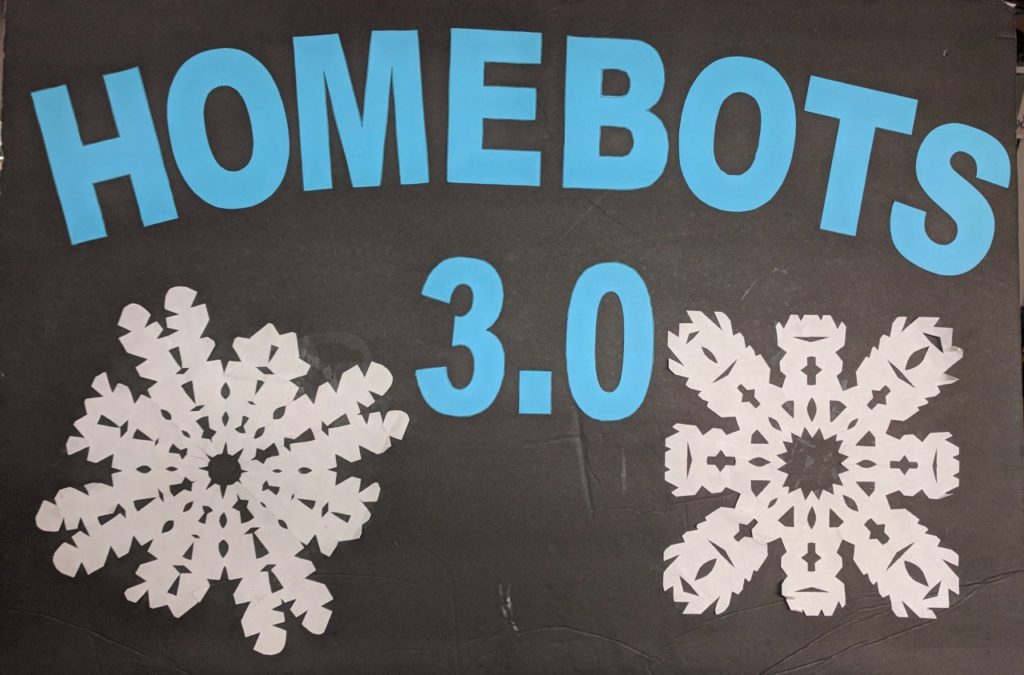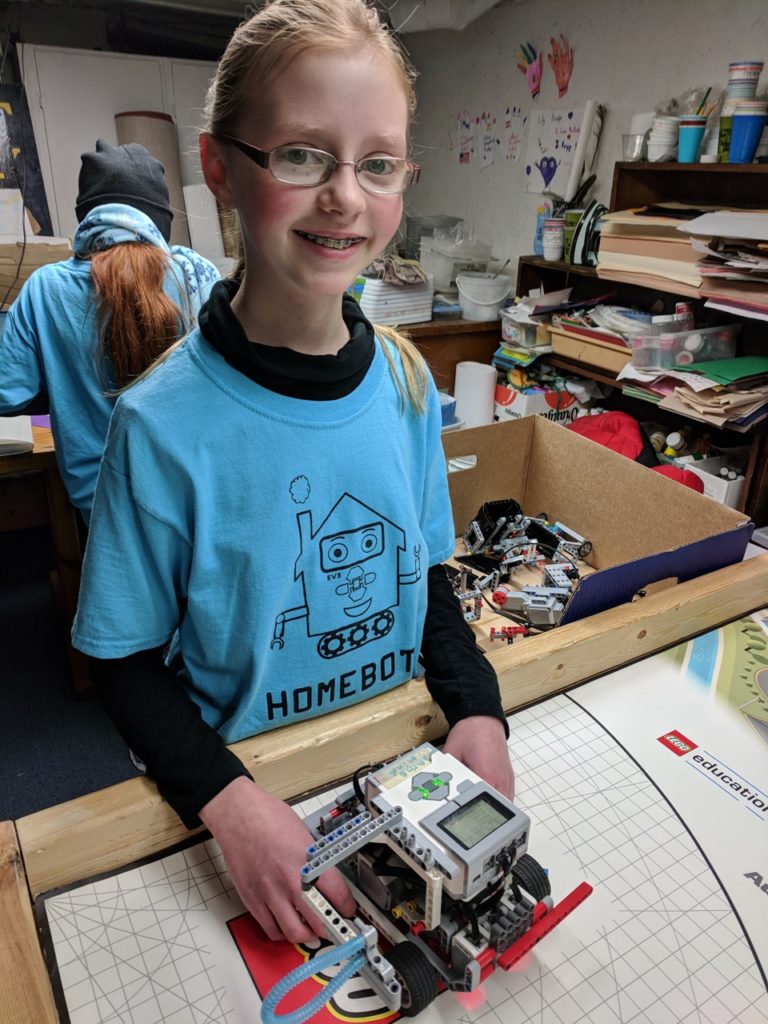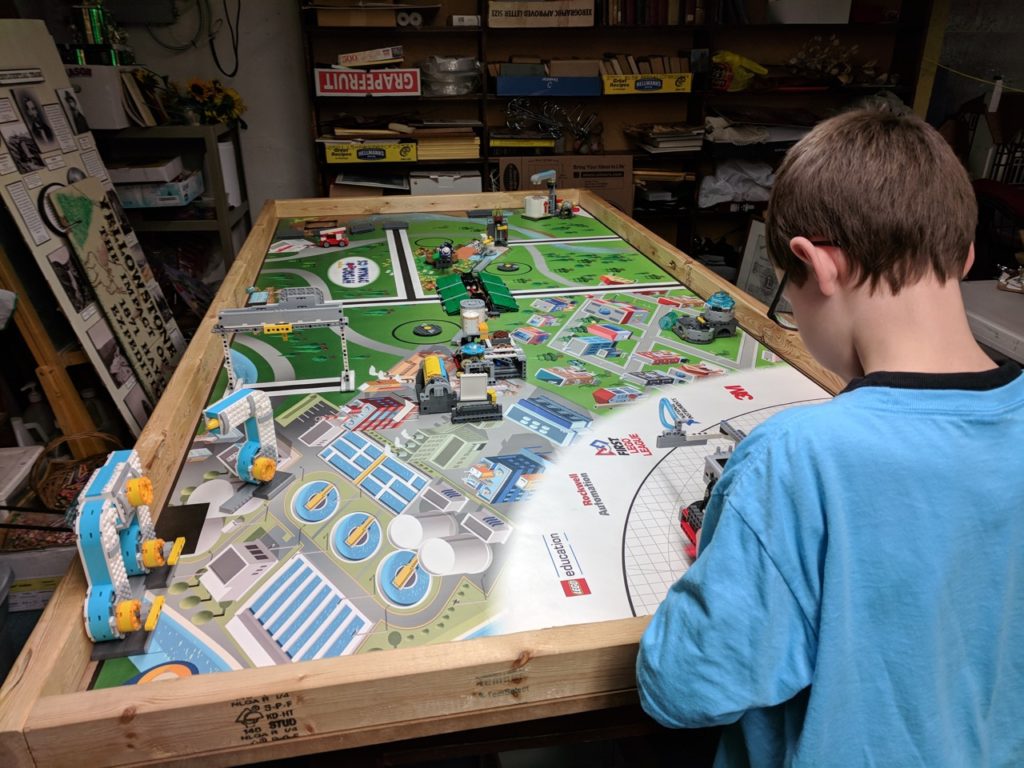Peru Kids Discovering the Excitement of Science, Technology, Engineering & Math

By Marque Moffett
Any visitor to Peru Free Library’s basement during recent months would have found the space practically bursting at the seams with activity as Homebots 3.0, the local Homeschool Robotics team, prepared for a series of First Lego League competitions.
First Lego League is a program that encourages kids to discover the excitement of science, technology, engineering, and math through hands-on experiences. In preparing for competitions, FLL teams spend time researching a real-world problem and designing solutions to address the problem. They also use Lego Mindstorms technology to design, build, and program their own robots for use in competition against other teams. The FLL has been turning kids on to STEM disciplines since 1998 and now has over 32,000 teams in 88 countries around the world.
Here in Peru, the Homebots 3.0 team’s six students, ranging in age from 9-12, work under the guidance of their adult coaches, Melissa Sayward and Tammy Neureuther, to meet the challenges set forth by FLL for the year. This year’s focus: Hydrodynamics – ways of finding, using, transporting, or disposing of water. The Homebots 3.0 leapt to the challenge, designing and implementing innovative plans for all three aspects of the FLL competition: development of a Project, competition in the Robot Game, and demonstration of Core Values.
For their project, Homebots 3.0 focused on an important local problem: the pollution of water by road salt. Through their own research and discussions with a biology professor, they learned about some serious impacts of salt pollution, including detrimental effects on wildlife and pollution of drinking water. For the FLL competition, it’s not merely enough to learn about a problem; students are tasked with proposing a possible solution. After considering all they’d learned, the team targeted the root of the problem: our current method of clearing snow and ice from winter roads. Homebots 3.0 gathered practical information from some experts in the field, including a plow specialist from the Viking-Cives company and a town highway foreman. Ultimately, the team proposed a modified plow design that included a “living edge” plow to remove more ice and snow from roadways, and the use of coffee grounds on roadways as a substitute for road salt.

Kaitlyn Neureuther & the Lego Mindstorm Robot

Team members prepare for the Robot Game on a practice table
The Robot Game aspect of the FLL challenge is quite different from the Project aspect. For the Robot Game, students had to design a robot that could complete a set of tasks that were specified by competition organizers. Imagine a small obstacle course on a large tabletop and you’ll be on the right track to understanding the Robot Game. Students used Lego Mindstorms technology to design, program, and build a robot that was compact and easy to maneuver. During the actual competition, teams can swap out attachments on their robots in order to complete different tasks, so team members worked hard to design innovative attachments that could easily be swapped out and reliably complete tasks at hand.
While the Project and Robot Game aspects of the FLL challenge emphasized learning and innovation, the Core Values aspect focuses more on the idea that teamwork, cooperation, and good sportsmanship are the foundation of good competition. To highlight their integration of Core Values, the Homebots 3.0 team wrote and performed a song for the judges.
Overall, Homebots 3.0 did very well. Advancing through two levels of competition, the team was thrilled to have made it to Finals for the first time ever. Equally important, though, were the experiences the students gained. In the months leading up to competitions, team members learned a lot about local hydrology, both through their own research and by speaking to several experts, including a biology professor, a plow specialist from the Viking-Cives company, and a town highway foreman. Ultimately, the students who work together as Homebots 3.0 gained enough confidence in their work that they were able to proudly present their proposal for modifying snow removal methods to the Lake Placid Village Council. Team members also further expanded their horizons as they traveled to various parts of NY state for competitions and met teams from all over the region. Having an opportunity to see other teams in action gave the Homebots 3.0 several of the “I hadn’t thought of that” moments that are so crucial for growth and progress.
Posted: April 12th, 2018 under General News, Peru News.
